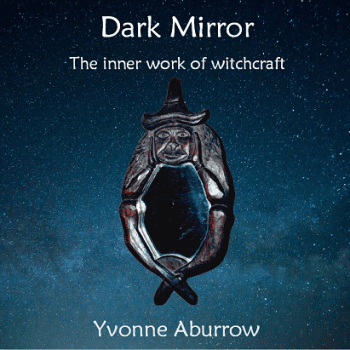Hello, beautiful creatures. After prattling on at length about saying no to gods, I thought it might be nice to change gears a bit. I want to talk about a rhetorical and philosophical concept I think is kind of important… by which I mean it’s key to understanding the howling problems in American culture1, unpacking the failure of modern discourse, analyzing our species’ present moment in history, and addressing some of the Pagan/polytheist/practitioner community’s challenges as a spiritual movement. Tall order, right? Well, for once, I have a simple answer to these issues… which is ironic as hell, because the concept to which I’d like to draw your attention is “nuance.”
Now, I’m confident that most of you know what nuance is, but I like to start with clear shared definitions, so: the Dictionary of the Resistance defines nuance as “a subtle distinction or variation,” “a subtle quality,” and a “sensibility to, awareness of, or ability to express delicate shadings (as of meaning, feeling, or value).”
You will note the recurrence of the word “subtle,” as well as the multiplicity inherent in the term: variation, shadings, distinction. Nuance is the quality of having complexity, not in a dramatic clash of high contrasts, but in gradients and tones. Nuance lives in the spaces between binaries, thriving in shadings and shadows, dancing on the edge of our comfort zones.
That last point is part of the problem, because human beings really dislike being uncomfortable.
Comfort as Both Warning Light and Metaphor
At a basic level, most human endeavors are attempts to create or preserve safety for ourselves and our family, tribe, team, or whatever other name give to “those like us”—and the remainder are attempts to create and perpetuate comfort. Discomfort is often seen as an early warning signal that whatever position or situation we’re experiencing has the potential to threaten our safety and cause us harm.
Of course, it’s amazing what one can get comfortable with. Some people are only made comfortable by hand-tailored suits, gold-plated toilets, and stripping civic and human rights away from anyone who isn’t like them. Other people find comfort in simpler things, like warm blankets, having an actual meal to eat, or a brief cessation of pain. Comfort can look like a thick down comforter over a memory-foam mattress, or like an Army surplus blanket spread out on the sidewalk.
Would losing the down comforter and the Army blanket cause equal discomfort to the people losing them?

Exactly so. It’s all about context. If we cast this situation simply as “someone lost their blanket,” well, that doesn’t sound so bad. It’s in the details that this narrative acquires the subtle distinctions, variations, and shadings of meaning and value which enable us to understand its complexity. It acquires nuance, and gives us a more accurate picture of the world around us.
Then again, there are people who claim not to understand the difference between the down comforter and the Army blanket. After all, they’re both blankets, right? For these folks, the loss of “comfort provided by a blanket” is seen as a flat category of experience, independent of context2. There’s a simplicity in this view which, to come full circle here, some people find deeply comforting. As I said earlier, humans really dislike discomfort, and nuance can be highly uncomfortable.
The Problem of Nuance
Why? Well, if I had to hazard a guess—and since I’m bringing it up, I kinda do—I’d suggest that it comes back to safety. As much as discomfort troubles us, being unsafe scares us. That’s kind of the point of fear, really: to keep us safe from things that can do us harm.
A nuanced world is a world in which it’s impossible to ever feel fully comfortable, or fully safe. A nuanced world can feel very much like a world that’s out to get us, because it’s a world without hard-and-fast rules, where truth is contextual and subject to change without notice. It’s a world we have to work to understand, all the while suspecting that our every effort is doomed to fail. A nuanced world is complex, complicated, and messy.
A simple world, governed by simple rules, isn’t messy. On the contrary, it’s reassuring. It’s an easy place to get a handle on, to feel like you understand what’s expected of you. It’s definitely not scary. It’s comfortable.
The trouble is, it’s also a lie. It’s a Disney-fied version of reality, one that conveniently elides anything that doesn’t fit inside the simplistic definitions and boundaries of its narrative conceit. Amusement parks are tidy. Real life is messy. It’s nuanced.
When confronted with the claim that our worldview is a delusion intended to keep us from engaging with (or even being aware of) the nuances of the real world, many of us react with disbelief. When asked to sacrifice our comfortable, comforting worldview to embrace a complicated, messy world filled with a lot of uncomfortable truths and very little in the way of down comforters, it should come as little surprise that many of us respond with fear… which, as Yoda reminds us, leads to anger, hate, and suffering.
So, what does all this linguistic handwringing and philosophical fiddle-faddle have to do with polytheism, Paganism, and magic? Stay tuned, true believers!
And in the meantime, dear ones, keep yourselves alive. ♥
- Note for non-American readers: Some of what follows is going to be pretty America-centric, focusing as it does on particular cultural phenomena within the nation-state of my birth. I’m not especially qualified to comment on other cultures, though I have observed similar phenomena from afar. Feel free to apply as much or as little of this to your own contexts as feels appropriate.
- This may seem overly simplistic, but I assure you, there really are people who see things in terms this simple. In related news, I’ve been told there are people who believe Inspector Javert was the hero of Les Misérables. ¯\_(ツ)_/¯
- Yes, I’m aware of the hypocrisy of quoting Yoda immediately after using “Disney-fied” as a derogatory term. As Bugs Bunny famously quipped, “A foolish consistency is the hobgoblin of little minds.”
















